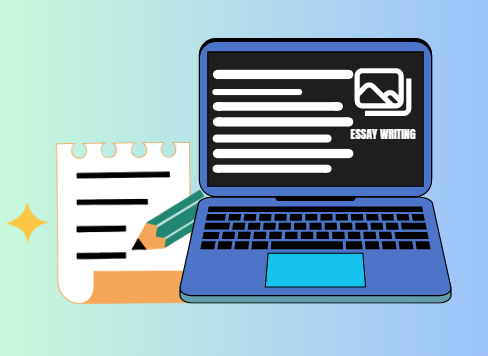Mastering the art of essay writing can significantly bolster your success in academic and professional spheres alike.
An exceptional essay is not only well-structured and grammatically flawless but also insightful and compelling, effectively engaging its readers. As you craft your essays with these key elements in mind, you’ll find your writing skills dramatically improving.
You’ve come to the right place if you’re seeking strategies on how to get better at writing essays. This article is designed to provide you with practical and effective methods to elevate your writing.
By using these strategies, you’ll enhance your writing skills and create work that is more polished, persuasive, and impactful.

1. Develop a Consistent Reading Routine
Many underestimate the transformative impact regular reading can have on enhancing their writing capabilities. If you aspire to refine your academic essay writing skills, cultivating a consistent reading habit is indispensable.

Immersing yourself in diverse reading material provides a wealth of knowledge about effective essay structure, narrative flow, compelling presentation, and nuanced word choice.
The manifold benefits of a regular reading routine include:
- Grammar proficiency: Reading routinely can significantly enrich your understanding of English grammar. This mastery can substantially reduce grammatical errors in your essays, lending them a polished, professional tone.
- Vocabulary expansion: When writing essays, articulating your thoughts creatively is paramount. Regular reading can foster a robust vocabulary, equipping you with a wide array of words and phrases to express your thoughts more effectively and vividly.
- Style versatility: Employing various writing styles can heighten your readers’ engagement. Reading exposes you to a plethora of writing styles, enhancing your adaptability and understanding of when to use different styles for maximum impact.
- Idea generation: Occasionally, we falter in expressing our thoughts in essays due to a dearth of unique ideas and perspectives. Reading can furnish you with these crucial components, enriching your essays with fresh insight and depth.
- Critical thinking skills: Reading also cultivates your critical thinking abilities. Critically analyzing a topic or idea yields multiple perspectives, providing a richer, more nuanced lens through which to view and discuss your essay topics.
To bolster your English essay development capabilities, seek out English content in all its diverse forms: books, articles, blog posts, social media captions, newspapers, newsletters, and more. Each source can offer unique insights and learning opportunities to enrich your academic writing.
2. Master Effective Research Techniques
Writing with superficial knowledge of a subject reflects an unprofessional approach. In-depth research is the cornerstone of strong, compelling writing.
The more you learn, the better you can share your knowledge. By conducting thorough research, you can explore the details of a topic, giving you the understanding needed to create valuable content for your readers.
Understanding your topic lends credibility and authenticity to your work. It enables the seamless integration of facts and examples, enriching your essay with concrete evidence and illustrative detail.
Neglecting research can lead to uncertainties during the writing process, potentially causing you to lose focus on your central argument.

To conduct effective research, consider the following strategies:
- Identify Relevant Sources: Seek out sources that provide comprehensive information about your topic. These could range from academic articles and books to reputable websites and expert interviews.
- Verify Source Credibility: It’s essential to ascertain the authenticity of your sources. Cross-check facts and ensure your sources are credible before relying on them for information.
- Synthesize Your Findings: Once you’ve gathered your research, create an organized overview of your findings. This allows you to distill the most relevant information and ensures you have a clear roadmap to follow when writing your essay.
3. Enhance Paraphrasing and Synthesis Abilities
Mastering the art of paraphrasing can significantly elevate the quality of your essays. Paraphrasing allows you to convey the same ideas using different words, thus infusing your work with diversity and freshness.
Carefully selected synonyms can invigorate your academic writing, making your essays more dynamic and engaging.

Paraphrasing is also a crucial tool when incorporating the ideas of others into your work. By effectively rewording these ideas, you can avoid plagiarism while maintaining the integrity of the original thought.
Whether you choose to rephrase online or paraphrase manually, here are some strategies to refine your paraphrasing skills:
- Understand the Original Idea: Before paraphrasing, ensure you fully grasp the original idea. This will allow you to maintain the core message while altering the language.
- Read and Rewrite: Read the content you intend to paraphrase several times, and then try to write it in your own words without looking at the original text. This practice can help you avoid direct copying.
- Note Down Key Points: When borrowing ideas from another’s work, jot down the main points you wish to incorporate into your essay. Then, rephrase these points to fit your narrative. This approach enhances the effectiveness of your paraphrasing and safeguards against plagiarism.
- Choose Synonyms Wisely: While replacing words with synonyms, ensure they accurately convey the original idea. Not all synonyms have the exact same connotation, so choose words that best fit the context.
- Verify Paraphrased Content: If you’re using a paraphrasing tool, always double-check the output for potential errors or awkward phrasing. Automated tools can sometimes miss the nuances of human language.
4. Adopt a Rigorous Editing and Proofreading Process
Despite your best efforts, errors can creep into your essay. These mistakes may range from grammatical errors and misspellings to punctuation missteps or unintentional omissions.
Proofreading is essential to identify and rectify these mistakes, helping you learn from them and avoid repetition in future writing. Beyond error detection, proofreading can also ensure your work is not too closely aligned with any sources you used, safeguarding against accidental plagiarism.
While many view proofreading as just the last step in writing, it is just as crucial as the earlier stages of brainstorming and drafting.

To maximize the effectiveness of your proofreading, consider these tips:
- Proofread After Writing: Avoid proofreading in the middle of the essay writing process, as it can disrupt your creative flow. Wait until you’ve completed your final draft before starting the proofreading process.
- Focus on One Error Type at a Time: Concentrate on one type at a time when checking for errors. For instance, in one pass, focus solely on punctuation. This approach allows for more efficient and thorough error detection.
- Repeat the Process: After your initial round of proofreading, take a break, then come back to your essay and proofread again. Repeating this process two or three times can help ensure no errors are left in the essay.
5. Understand the Structure of an Effective Essay
A well-structured essay not only facilitates a coherent and logical flow of ideas but also enhances the readability of your work. To master the craft of essay composition, it’s crucial to comprehend the fundamental structure of an effective essay, which typically includes an introduction, body paragraphs, and a conclusion.
- Introduction: This is your first opportunity to grab your reader’s attention. A compelling introduction provides a brief overview of the topic and presents the thesis statement – your essay’s central argument or focus. It sets the stage for the discussion that follows and gives the reader an idea of what to expect.
- Body Paragraphs: This is the heart of your essay, where you elaborate on your arguments in detail. Each paragraph should focus on one main point, supporting your thesis. Start with a topic sentence to introduce the main point, followed by evidence or examples to substantiate it, and then conclude the paragraph by linking the point back to your thesis.
- Conclusion: This is your final opportunity to leave a lasting impression on your reader. A strong conclusion summarises the main points of your essay, reaffirms your thesis in light of the arguments discussed, and, ideally, leaves the reader with something to ponder upon.
Understanding and effectively implementing this structure in your essays will ensure your ideas are presented logically, clearly, and persuasively. Remember, while this structure serves as a guideline, flexibility is key – depending on the essay type and topic, some deviation or adjustment might be necessary.
6. Master the Art of Argumentation
In many essays, especially those of a persuasive or analytical nature, developing a solid, compelling argument is essential. The art of argumentation is not merely about stating your opinions but about presenting them in a logical, convincing manner supported by credible evidence. Here are some strategies to enhance your argumentation skills:
- Clear Thesis Statement: Your thesis statement is the heart of your argument. It should be clear, concise, and directly address the topic at hand. A well-crafted thesis sets the tone for your essay and guides the development of your argument.
- Logical Structure: Arrange your points in a logical sequence to make your argument easy to follow. Each point should build on the previous one, gradually leading your reader toward your conclusion.
- Supporting Evidence: Each point you make should be backed by relevant evidence. This can come in the form of statistics, quotations, examples, or references to reliable sources. Evidence not only strengthens your argument but also enhances your essay’s credibility.
- Address Counterarguments: Anticipating and addressing counterarguments demonstrates a deep understanding of the topic and adds depth to your essay. By acknowledging opposing viewpoints and refuting them effectively, you make your own argument more robust and persuasive.
- Concise and Clear Language: Clarity and conciseness are key in argumentation. Avoid overly complex sentence structures and jargon. Your goal is to communicate your ideas as straightforwardly as possible so your reader can easily follow your argument.
By mastering the art of argumentation, you’ll be able to write essays that are not only compelling but also engaging and persuasive. This skill is crucial for essays and valuable in many academic, professional, and everyday life aspects.
7. Familiarize Yourself with Various Citation Styles
Proper citation is a fundamental aspect of academic writing. Citing your sources correctly not only provides credit where it’s due but also lends credibility to your essay and allows readers to locate the original sources if they wish to delve deeper into the topic.
There are several citation styles, each with its own set of rules for formatting references. Familiarizing yourself with the major ones will make your writing process smoother and ensure your work adheres to the expected academic standards. Here are a few common citation styles:
- APA (American Psychological Association): Predominantly used in the social sciences, this citation style typically requires in-text citations along with a reference list at the end of the essay.
- MLA (Modern Language Association): Commonly used in the humanities, MLA style uses parenthetical in-text citations and requires a Works Cited page at the end of the essay.
- Chicago/Turabian: This style is generally used in history and some social sciences. It offers two citation systems: notes and bibliography and author-date. The choice between the two usually depends on the subject matter and the nature of the sources cited.
- Harvard: A widely used citation style, especially in the UK and Australia, that includes the author’s name and publication year within the text and a reference list at the end.
Remember that different institutions, disciplines, and even individual professors may have their own preferred citation styles. Always check the requirements before you start writing your essay. Using citation tools and software can also help manage your references and ensure they are formatted correctly.
Understanding various citation styles not only helps you avoid plagiarism but also demonstrates your respect for the intellectual property of others, an essential aspect of academic integrity.
8. Expand Your Vocabulary and Learn to Use It Appropriately
A strong vocabulary is a valuable tool in essay writing. It allows you to express your ideas more clearly, persuasively, and engagingly. It’s not just about learning a bunch of complex or rare words; it’s about understanding their nuanced meanings and using them appropriately in context.
Here are some strategies to expand your vocabulary and use it effectively:
- Read Widely and Regularly: Exposure to different genres, styles, and fields of literature can introduce you to a wealth of new words. Pay attention to how these words are used in context and try to infer their meanings.
- Use a Thesaurus and Dictionary: Try to vary your word choice when writing. If you find yourself using the same word repeatedly, consult a thesaurus for synonyms. However, always cross-reference with a dictionary to ensure the new word carries your intended meaning.
- Learn Roots, Prefixes, and Suffixes: Understanding the building blocks of words can help you decipher unfamiliar words and enrich your vocabulary.
- Practice: Regularly practice using new words in your writing and daily conversation. This will help solidify your understanding and make these words a natural part of your vocabulary.
- Contextual Understanding: Always consider the context in which a word should be used. Some words may have different meanings depending on their usage. Misusing a word, no matter how sophisticated it sounds, can undermine your argument and confuse your reader.
Expanding your vocabulary and learning to use it appropriately will enhance your proficiency in academic writing and improve your overall communication abilities. Remember, the goal is to communicate your ideas clearly and effectively, not to overwhelm your reader with complex terminology.
9. Practice Regularly and Seek Feedback
Like any other skill, improving your writing abilities requires consistent practice and constructive feedback. Writing regularly can help you familiarize yourself with the process, develop your style, and gradually refine your skills.
Here are a few strategies for effective practice and seeking helpful feedback:
- Write Regularly: Make writing a daily habit. Whether it’s an essay, a journal entry, or a blog post, the act of writing itself can help improve your skills over time. You can experiment with different essay types and topics to broaden your abilities.
- Ask for Feedback: Don’t hesitate to seek input on your work. This could be from a teacher, a tutor, a classmate, or even a friend. Constructive criticism can provide valuable insights into areas of improvement you might not notice on your own.
- Self-Review: Along with external feedback, self-review can be very beneficial. Reading your own writing critically can help you spot common errors, identify patterns, and recognize your strengths and weaknesses.
- Revise and Edit: Based on the feedback you receive, revise and edit your work. This step helps you improve the current essay and equips you with practical knowledge to avoid similar mistakes in future essays.
- Join a Writing Group: Participating in a writing group can provide you with regular feedback from other writers. The diverse perspectives can help you see your work from different angles and inspire new ideas.
Remember, becoming proficient at essay writing is a journey, not a destination. It’s a continuous process of learning, practicing, receiving feedback, and refining. With persistence and determination, your efforts will lead to noticeable improvement over time.
10. Embrace a Growth Mindset
Developing a growth mindset, a concept coined by psychologist Carol Dweck can significantly enhance your essay writing skills. A growth mindset is a belief that abilities and intelligence can be developed through dedication, hard work, and constructive feedback. It contrasts with a fixed mindset, where abilities are seen as innate and unchangeable.
Applying a growth mindset to your writing means viewing challenges as opportunities for growth rather than insurmountable obstacles. It involves embracing mistakes as learning experiences and valuing the process over the end result. Here’s how you can nurture a growth mindset for your essays:
- Understand That Mistakes Are Part of the Process: Don’t be disheartened by mistakes or criticism. They are valuable feedback and essential for growth. Each error is an opportunity to learn and improve.
- Celebrate Small Wins: Recognize and celebrate progress, no matter how small. If you’ve written an extra paragraph, used a new word correctly, or received positive feedback, take a moment to appreciate your progress.
- Seek Challenges: Push yourself out of your comfort zone. Choose essay topics that are challenging or unfamiliar. Your effort to tackle these challenges will drive your growth and skill development.
- Persist in the Face of Setbacks: Persistence is key to a growth mindset. If an essay didn’t turn out as well as you’d hoped, take it as a learning opportunity. Analyze what went wrong and how you can improve it next time.
- Value Effort Over Talent: Believe that hard work, not innate talent, is the key to success. Even the most talented writers need to hone their skills through continuous practice and effort.
Adopting a growth mindset will motivate you to put in the effort required to improve your writing prowess. You’ll learn to value the journey, embrace challenges, and persistently strive for improvement.
Conclusion
In summary, enhancing your essay writing skills involves a blend of diligent practice, learning, and an openness to growth. The strategies highlighted in this article — including consistent reading, effective research, skillful paraphrasing, rigorous proofreading, understanding essay structure, mastering argumentation, familiarity with citation styles, vocabulary expansion, and regular feedback — are integral to this process.
Improving your writing skills enhances your overall communication, paving the way for success in both academics and your career. Keep in mind that becoming a skilled writer is a journey filled with ongoing learning and opportunities for growth. Embrace this journey and take pride in your progress along the way. Happy writing!